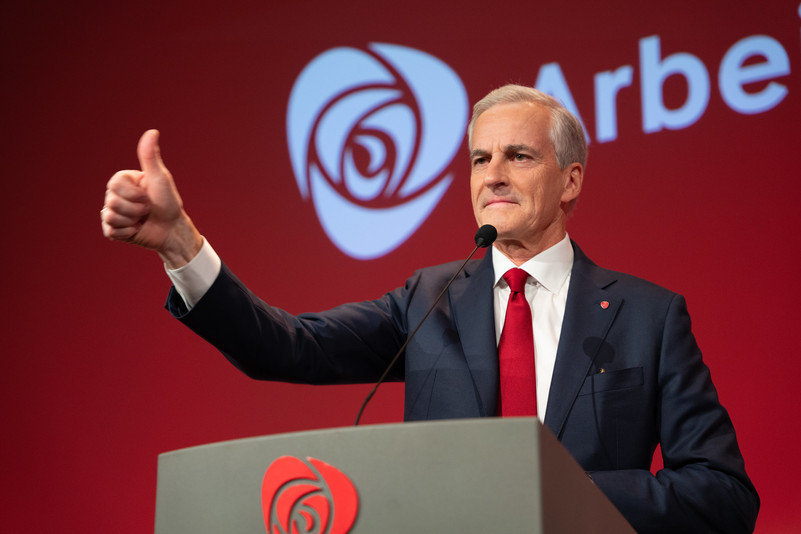
By Karen Andersson & Laura Rossi
In a new political tune, the 5 Nordic countries (Norway, Sweden, Finland, Iceland and Denmark) are aligned with the left turn to power after almost 60 years. At the beginning of last September, to Norway, until then being the only Scandinavian country led by a conservative government, elegeu Jonas Gahr Støre, labor party leader, for the post of prime minister. Støre directed his campaign and his speech to the “ordinary people”, what enchanted the population. This charm can be seen in the numbers., that showed a record of more than 1,6 million Norwegians registering their vote (not mandatory in the country), representing like this 42,3% of the electorate. Besides that, due to the Covid-19 pandemic, the Norwegian people have been positioning themselves in favor of a more present state that promotes less inequality in the country, reflecting on greater political participation on their part..
Generally, the left reinforces the preservation of the welfare state and engagement with the climate agenda. According to the Program of United Nations for the development (UNDP), with the data disclosed in 2020, the Nordic countries are very well positioned in the ranking of the best HDIs in the world. Besides that, as 5 nations are also at the top of the list of countries with the happiest population in the world, on the UN Global Happiness Index. Therefore, it is noticeable that all these issues are interconnected., because since there is respect for diversity and access to basic rights (how low social inequality, safety, quality education and health), a satisfied and happy society is formed, what contributes to social progress and the good positioning of these countries in the development indexes.
According to researches, one of the main reasons that explain the victory of the center-left wing in the elections is the environmental issue. After all, after intense floods, alarming fires and worrying temperature rise across Europe, mainly during the last summer, the attention of the european population, as a whole, has never been so focused on this issue as it is currently.. Concern was heightened with the presentation of the IPCC report (Intergovernmental Panel on Climate Change), carrying the UN secretary general, António Guterres, defining the situation as a "red alert to humanity". However, as usual, the environmental issue contrasts sharply with economic and financial spheres..
Taking the case of Norway as an example, the situation is no different. The country is not only the biggest oil producer in Western Europe, as your oil industry also amounts to 14% do PIB nacional, 40% of its exports and generates about 160 thousand jobs. Because it is essential to the Norwegian economy, oil provokes a contradictory clash in the nation when set against environmental issues, evidencing a clear conflict of interest.
In this way, even though the left is in power in all the Nordic countries today, that doesn't mean the right is, necessarily, losing strength. Segundo Jonas Hinnfors, University of Gothenburg political scientist, “the latest election results can be attributed to divisions on the right and center, and not so much to a supposed revival of the left”. Hinnfors' argument is supported by Yohann Aucante, specialist in Nordic topics at the University of Social Sciences in Paris (EHESS), which affirms a fragile condition of the current situation of “5 by 5” left-wing governments in the region.
In addition to the center and right parties still remaining influential, many of the measures and positions of left-wing parties in Scandinavian countries lean towards a more conservative aspect.. this is pictured, for example, in the strict anti-immigration measures of the 5 countries imposed by the labor parties themselves. Thereby, despite the current political alignment of the Nordic countries, a leftist government does not necessarily imply the adoption of more progressive policies.
REFERENCES
Walls, Norberto. "What does the left turn mean in the 5 Nordic countries". BBC, 23 September 2021. Available in: https://www.bbc.com/portuguese/internacional-58662615
“The happiest and happiest countries in the world in 2021”. Idealista news, 02 July 2021. Available in: https://www.idealista.pt/news/financas/economia/2021/07/01/47977-os-paises-mais-felizes-e-infelizes-do-mundo-e-2021-sao
“All five Scandinavian countries now have centre-left govts. But the right hasn’t been reduced to irrelevance”. The Indian express, 21 September 2021. Available in: https://indianexpress.com/article/opinion/editorials/far-right-centre-left-governments-brexit-us-7523345/
"Women cease to be majority in Icelandic parliament after recount of votes". State of Minas, 26 September 2021. Available in: https://www.em.com.br/app/noticia/internacional/2021/09/26/interna_internacional,1309046/mulheres-deixam-de-ser-maioria-no-parlamento-islandes-apos-recontagem-de-vo.shtml
Barreto, Marcelo Menna. "center-left starts to command Nordic countries". Extra class, 21 September 2021
"Norway continues to bet on oil despite warnings". State of Minas, 11 June 2021. Available in: https://www.em.com.br/app/noticia/internacional/2021/06/11/interna_internacional,1275809/noruega-continua-apostando-no-petroleo-apesar-das-advertencias.shtml
Preel, Marc e Deshayes, Henry Pierre. “Is the Nordic swing to the left nothing but an illusion?”. The local, 15 September 2021. Available in: https://www.thelocal.se/20210915/analysis-is-the-nordic-swing-to-the-left-nothing-but-an-illusion/
